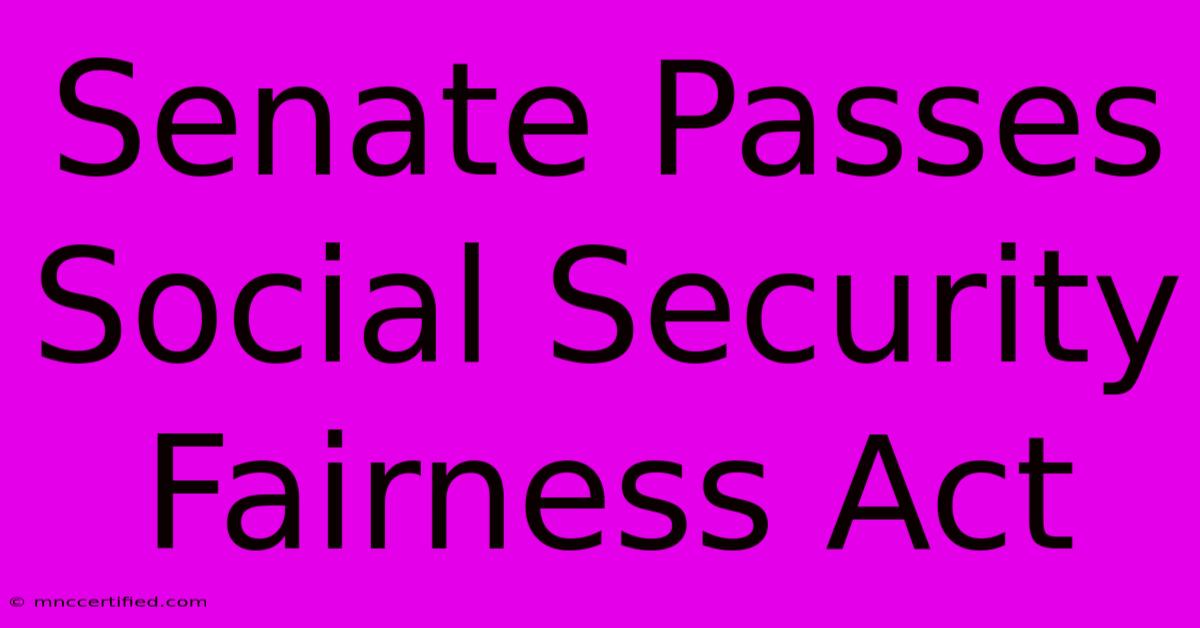Senate Passes Social Security Fairness Act

Table of Contents
Senate Passes Social Security Fairness Act: A Victory for Disability Beneficiaries?
The Senate's recent passage of the Social Security Fairness Act marks a significant step towards addressing long-standing inequities within the Social Security Disability Insurance (SSDI) program. This legislation, if enacted into law, promises to provide much-needed relief to a substantial population of disability beneficiaries. But what exactly does the act entail, and what are its potential implications? Let's delve deeper.
Understanding the Social Security Fairness Act
The Social Security Fairness Act primarily aims to rectify the unfair reduction in benefits for individuals who became disabled before reaching full retirement age. Currently, SSDI benefits are reduced for those who begin receiving them before reaching their full retirement age. This reduction, often substantial, disproportionately affects individuals with disabilities who may have limited opportunities to work and earn additional income. The act seeks to eliminate this penalty, ensuring that disabled individuals receive the full benefits they are entitled to, regardless of when their disability began.
Key Provisions of the Act
- Elimination of the Windfall Elimination Provision (WEP): The WEP currently reduces SSDI benefits for individuals who also receive a pension from a job not covered by Social Security. This often impacts teachers, firefighters, and other public employees. The act aims to repeal this provision, ensuring fairer benefits calculations for these individuals.
- Addressing the Government Pension Offset (GPO): Similar to the WEP, the GPO reduces spousal or survivor benefits for individuals receiving a pension from a non-covered government job. The act also seeks to eliminate this offset, providing more equitable benefits for surviving spouses and partners.
- Impact on Disability Beneficiaries: The most significant impact will be felt by individuals who became disabled before reaching full retirement age. The removal of the early retirement penalty will allow them to receive their full calculated benefits, offering a crucial financial boost.
Who Benefits Most from this Legislation?
The Social Security Fairness Act will provide significant relief to several groups:
- Individuals with disabilities who started receiving benefits before full retirement age: This group will see the most immediate and substantial benefit.
- Teachers, firefighters, and other public employees: Eliminating the WEP will be especially beneficial for these groups, who often have lower Social Security benefits due to their alternative pension plans.
- Surviving spouses and partners of individuals receiving government pensions: The elimination of the GPO will provide more substantial support for these individuals.
Potential Challenges and Future Outlook
While the Senate's passage is a positive development, the act still needs to pass the House of Representatives and receive presidential approval to become law. There may be ongoing debates regarding the financial implications of eliminating the WEP and GPO, as these changes will increase the overall cost of the Social Security system. However, proponents argue that the fairness and equity considerations outweigh the financial costs.
The Act's long-term impact will depend on several factors, including the final version of the legislation and the resources allocated to its implementation. However, its passage represents a crucial step toward creating a more just and equitable social security system for disabled individuals and those affected by the WEP and GPO.
SEO Keywords Used:
- Social Security Fairness Act
- SSDI
- Social Security Disability Insurance
- Windfall Elimination Provision (WEP)
- Government Pension Offset (GPO)
- Disability benefits
- Senate
- House of Representatives
- Retirement age
- Social Security Reform
This article aims to provide comprehensive information while strategically incorporating relevant keywords for improved SEO performance. Remember to promote this article through social media and other channels to maximize its reach.

Thank you for visiting our website wich cover about Senate Passes Social Security Fairness Act. We hope the information provided has been useful to you. Feel free to contact us if you have any questions or need further assistance. See you next time and dont miss to bookmark.
Featured Posts
-
Live Blog Atletico Vs Barcelona La Liga
Dec 22, 2024
-
Arsenal Thrash Palace 5 1 Full Report
Dec 22, 2024
-
Watch Aston Villa Vs Man City Premier League
Dec 22, 2024
-
Aston Villa Defeats Man City
Dec 22, 2024
-
Texans Dell Seeking Bigger Role In 2024
Dec 22, 2024